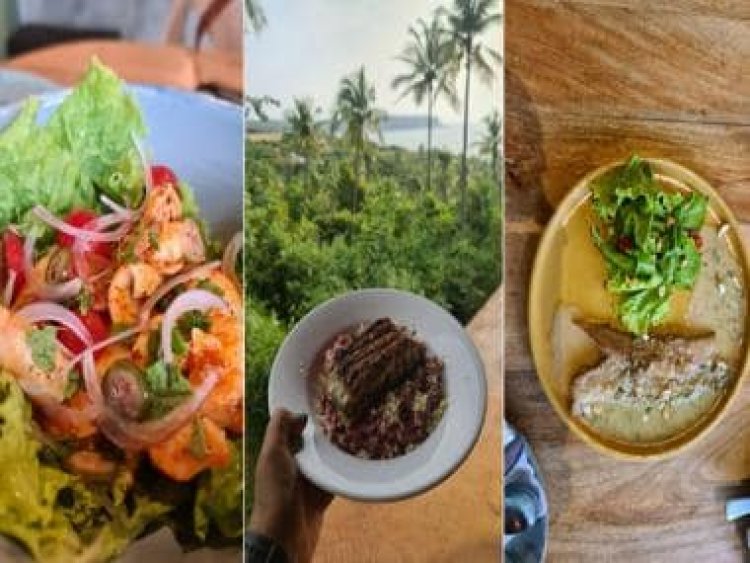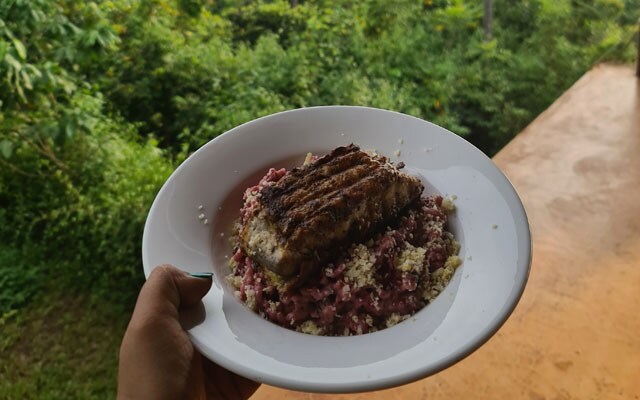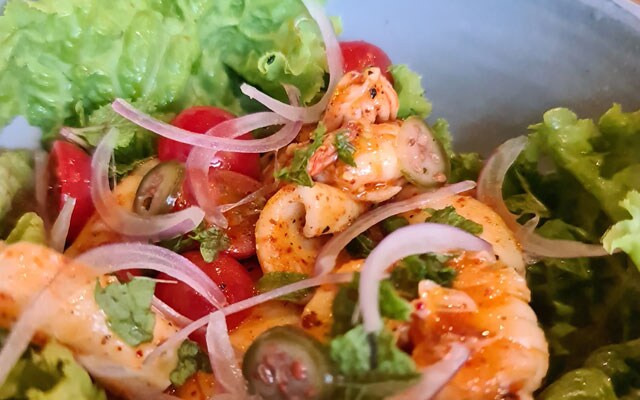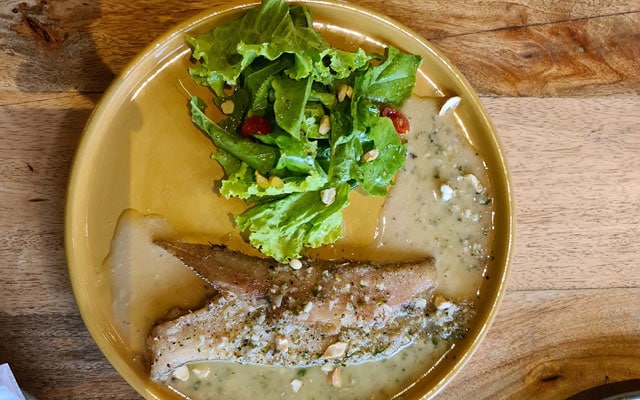Food Friday | A plant-forward platter in Goa
Food Friday | A plant-forward platter in Goa

When speaking to Reema Gupta, an organic farmer now residing in Goa, I came across the term ‘regenrative farming’ for the first time. Over the last 15 years, Gupta has planted over 400 trees that make up 70 varieties of seasonal and organic fruit trees, organic spices and neem trees. “We also inter-crop organic vegetables, organic turmeric and organic ginger in tune with permaculture design and regenerative farming techniques”, shared Gupta on a phone conversation with me.
While the ‘Save Soil’ movement by Sadhguru stirred up controversies, regenerative farming approach is actually a way of preserving the sanctity and quality of farm soil, with a conservation and rehabilitation approach to food. Gupta shared with me how and why organic produce costs more than hybrid produce and hence is a cause of concern for many restaurateurs to move to organic sourcing in the long run. “Unless you have the space or the will to get involved in the production process, very few would actually take up organic sourcing for a restaurant business in my experience”, she told me.

Chef Halton D’Souza at a popular Panjim bar is ready for the challenge. He has already started growing vegetables that the menu at Petisco requires from time to time and uses them in his recipes. Similarly, a great many young Chefs and restaurant owners in Goa are thinking about organic sourcing, with some succeeding in setting up partnerships with local farmers and some growing their own. For instance, the Flying Goat Cafe in Anjuna offers a farm-to-table experience from its own garden of herbs, heirloom tomatoes or gongura leaves. I remember having the Greek Fava which contained a split pea dip, made from garden grown split peas. More than the taste, what struck me was the pride with which the restaurant explains its dishes to the guests, with a walk along the garden where you can see what came to your plate.
Goa is becoming a hotbed of culinary innovation and culture shaping, with a collection of intrigued, inspired and young chefs ready to take on the challenge of offering a meaningful menu, often inclined on the vegan movement and definitively, a focus on sourcing locally. Take Lollo Rosso, a newly opened restaurant in North Goa. The brand arrives after it’s roaring success in Ahmedabad, offering a curious menu consisting Japanese, Korean and Mexican items. Tarak Das, the proprietor and Head Chef took me through his thought process on a pleasant winter evening, overlooking the farmlands adjacent to the bistro. “I have removed ingredients taht are not possible to source here locally and added my twists to them. Our Chef’s special bowl often contains seasonal items available in our own garden like jackfruit”, Das informed.

Jackfruit is a typical food item for many Indian communities. Unripe ones are used to make koftas (balls) and curries, and it is now a fond choice for vegetarians in a biryani too. Das also grows herbs and vegetables such as tomatoes and avocados in his garden at the restaurant. “The quality of avocados in the market is questionable more often than not, so I decided to grow them instead”, Das explained.
Vegetarianism and plant-based food sourcing is reshaping Goa’s culinary trails. In a meat-forward state, young Chefs and gastronomy enthusiasts are finding ways to introduce local plant flavours back onto the plate. And it is not only standalone restaurants who are treading this path. Cabo Serai, a plantation resort on a lesser known beach in South Goa uses garden-grown amaranth, chillies, fruits and greens for its daily changing menu. Trupti Wesley, the charming host and co-owner at the hotel explains, “We only source ingredients that are in season from within 3 kms of our hotel, so that we don’t import food from anywhere else for both wellness reasons and to reduce our footprint.”

The staff also enjoys experimenting with the day’s available produce to come up with items for the menu. “If we need ingredients that we don’t here, we source them from nearby villages viz. Khuddi, Khola, Gaval and Betul for all our seafood due to its availability of daily fishing produce by the community”, added Wesley with a pride that is visible in her eyes when she says it.
So what does one mean when they say it’s ‘Plant forward’?
Chef Sandeep Sreedharan offered an explanation. He has been running Mahe, the coastal fine dining restaurant in Anjuna with mentionable success and it was his fascination with plant based ingredients and vegetarianism that gave rise to the idea of Elaa, a cafe that serves plant forward dishes in a serene setting by a stream in the lap of nature in Anjuna. “Plant forward is not difficult to understand. It is all about using items and ingredients that are coming from organic farms and directly from the plants without any processing, and takes the centre stage on a platter.”
My interpretation of his approach comes alive in the black rice poha or the Tomato Medley salad that uses heirloom tomatoes. Even the non-vegetarian items significantly show the presence of plant based ingredients be it the tropical greens in a Clam soup or the alsande beans, sorghum and millet tacos that Sreedharan serves.
Gupta’s reservation about the uptake on a plant based diet is founded on the grounds of trends in food. “When on holiday, people want to indulge. But the idea of guilt-free eating and a subtle movement in being conscious of your food choices may be able to drive this idea forward among larger audiences.”
Sreedharan too thinks that the influence of international cuisine is making the plant-forward business feasible with the consumption choices of his guests. “I think it (Veganism and plant forward food) still has some way to go as Indian flavours find acceptance in the space. I enjoy the fun you can have with Indian flavours and build a distinctive flavour profile, not conforming to already popular cuisines one may find in places like Bali”, he added.
Chef Zacharia Thomas’s initiative Locavore is trying to make sense of complex food systems in India that are vast and messy that make responsible food choices by no means an easy task. Chef Zac is willing to get his hands dirty when it comes to going deeper into local markets and farms, experiment with flavours and have conversations with experts from across fields to find newer ways of improving the availability and use of locally sourced produce. As more and more bold restaurateurs come forward to explore different ways of sustainable yet profitable sourcing of ingredients, plant forward food finds a firmer footing in the ever evolving Goa culinary scene.
Global warming and climate change poses a serious threat to vegetable that are fast disappearing from the mass market. Reema Gupta shared her experience of witnessing the loss of cherry tomatoes just over two seasons as rain patterns change drastically in the two states she has haer orchards in. With fast changing climate, a plant forward business can add to the interest and encouragement to produce locally and sell locally for growers, Gupta pointed to me. And I concur.
Read all the Latest News, Trending News, Cricket News, Bollywood News, India News and Entertainment News here. Follow us on Facebook, Twitter and Instagram.
What's Your Reaction?



























































